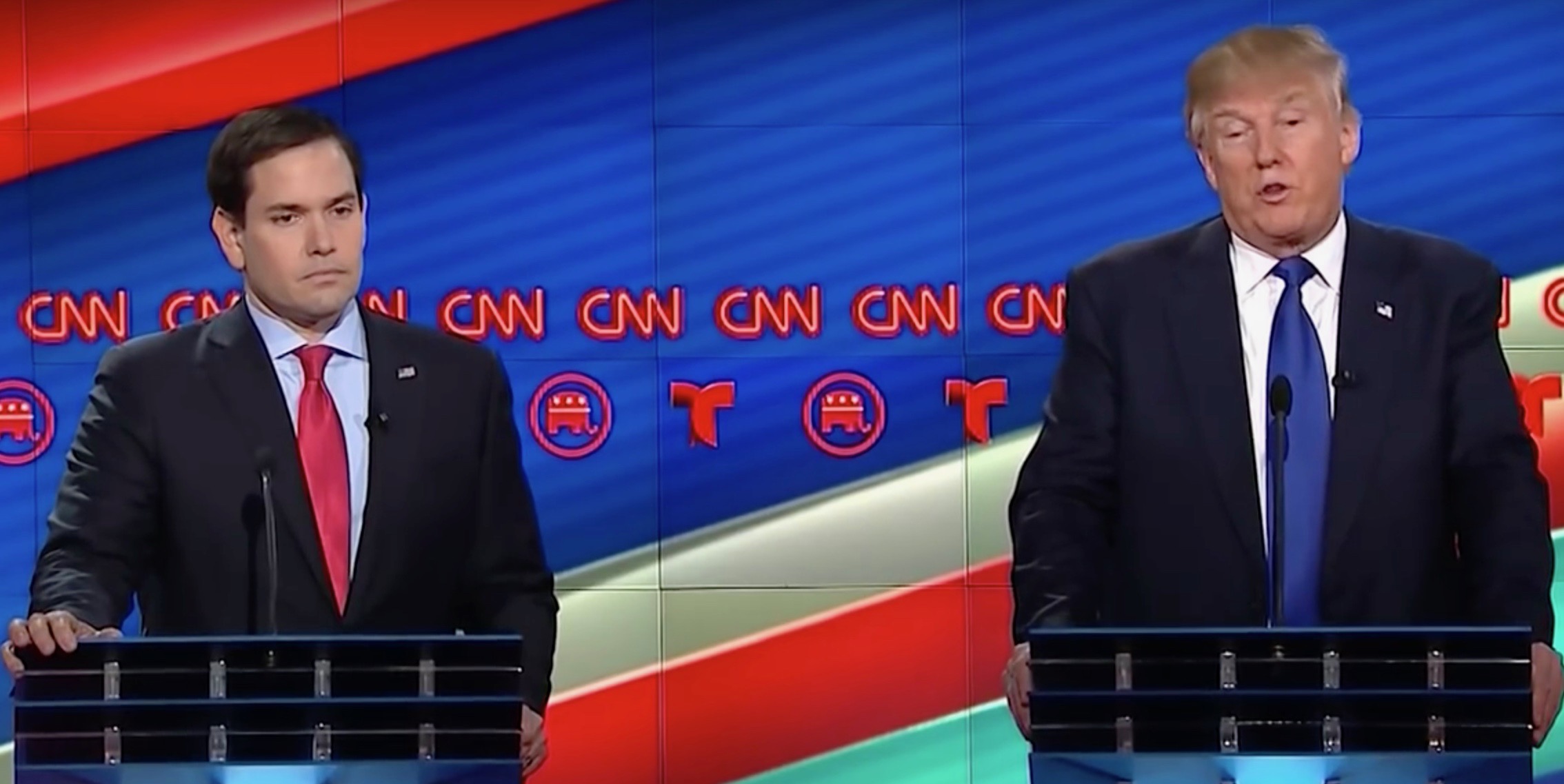
Once estranged, they reunite over a White House meal with Cuba on the menu
In case you missed it, President Trump made big news during his epic press conference at the White House this week. He broke bread with Senator Marco Rubio.
During the presidential primaries, then-candidate Trump and Sen. Rubio traded insults on the campaign trail, but then traded endorsements in advance of their successful runs for the presidency and reelection to the Senate.
Having won his election, Sen. Rubio resumed his plainspoken disagreements with the new President – tweeting one day, “We are not the same as #Putin,” and later adding his support for including the “Flynn situation” in the Senate Intelligence Committee probe of Russia’s interference in the U.S. election.
Both men now appear to have the situation in hand. Wednesday evening, as CNN reported, the President, the Senator, and their wives gathered for dinner in the Blue Room at the White House.
Things must have gone well. As President Trump said, “We had dinner with Senator Rubio and his wife, who is, by the way, lovely. And we had a really good discussion about Cuba because we have very similar views on Cuba.”
And now: President Trump is heading to Florida for a campaign-style rally at the Orlando-Melbourne International Airport on Saturday. What would Scooby say? Ruh-oh.
Politico, in a profile of Senator Bob Corker, Chairman of the Senate Foreign Relations Committee, wrote that he, “like the rest of Washington…is still figuring out who’s actually in charge in the Trump White House and how to get things done given the multiple power centers that seem to be shaping foreign policy.” Sen. Rubio may have cracked the code.
During the final stretch of the 2016 presidential campaign, as we previously reported, Mr. Trump returned to Florida to reverse his prior support for lifting the embargo by adopting an anti-engagement position aligned with hardliners like Sen. Rubio and the three Cuban American representatives from South Florida. After the election, President-elect Trump stocked his transition team with advocates who want the U.S. to return to its Cold War posture of isolating and sanctioning Cuba.
Loyalty casts a long, influential shadow. Despite results showing that Mr. Trump lost Miami-Dade County – and lost the Cuban American vote nationally – he credits voters in the Cuban community for his win in Florida last November. As he said at his press conference, “Cuba was very good to me in the Florida election, you know, the Cuban people, Americans.”
In response, supporters of engagement with Cuba have massed around a retro strategy of trying to interest the new administration in preserving the last administration’s reforms by presenting them with “the facts.”
Representative Tom Emmer (MN-6) related how closer relations with Cuba, including the economic impact of loosening restrictions on U.S. travel and trade, contributed to transformative changes on the island that are making life better for the Cuban people.
“Consider the following statistics,” Rep. Emmer writes in a column called Continuing the Shift on Cuba. “From 2008-2015: the number of mobile phone subscriptions in Cuba has increased to 3 million; the number of Wi-Fi hotspots on the island increased from zero to 65 by the end of 2015 and continues to grow; and the percentage of the island’s workforce in the Cuban non-agricultural private sector (which consists largely of self-employed entrepreneurs known as cuentapropistas) has grown from 17 to 29 percent.”
Pedro Freyre, a noted international lawyer and Columbia Law School Professor, laid out the economic consequences of shutting down travel and trade in the Orlando Sentinel. “A drastic change in U.S. policy toward Cuba would also result in a loss of U.S. jobs not only in the travel industry but more significantly in pharmaceutical manufacturing, and most sensitive of all, in the agricultural sector that currently does substantial business with Cuba.”
Even more, as the economist Ricardo Torres, writing for Progreso Weekly, says: A policy reversal would compromise the objectives that U.S. policy ought to be embracing.
Cuba, for its purposes, has engaged in evolutionary change for several decades, by deepening its engagement with the international economy. Dr. Torres writes: “Today, more people than ever are coming to Cuba. More Cubans travel abroad for various reasons than at any previous time. A growing number of businesses operate in the country, both commercial and investment companies.”
Then, he adds, “The transformation is huge, and several elements indicate that it can accelerate in the next several years.” So long as the U.S. doesn’t abruptly change course.
Politico contrasts the Democratic opposition to the Trump presidency, which it calls “divided and demoralized,” with Republican Senators John McCain and Lindsay Graham, who are “waging a public war of press releases against what they see as Trump’s dangerous challenge to America’s role in the world.”
“Rather than turning their fire on a prickly president who clearly takes criticism personally,” Politico says Sen. Corker is pursuing a third path, “arguing in the backstage councils of Capitol Hill that they should seek to influence Trump more quietly.”
He is almost certainly right; the question is whether he is too late. We’ll be watching what happens tomorrow in Orlando, and in further developments down the road, in case Sen. Rubio cracked the code by getting invited to a quiet White House dinner first.
(From Cuba Central)

